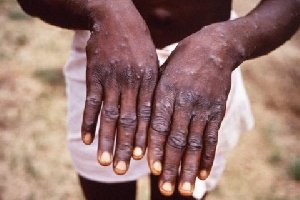South Africa has recorded its second death linked to the (Monkey POx) Mpox outbreak, health officials reported on Wednesday.
The viral disease, primarily affecting men, has prompted authorities to expand their efforts to trace the contacts of those infected.
The latest fatality was a 38-year-old man who passed away in a KwaZulu-Natal (KZN) hospital on the same day his Mpox infection was confirmed through testing.
Earlier this week, the country reported its first Mpox-related death, a 37-year-old man in Gauteng province, who died shortly after admission to the hospital.
South Africa has now identified a total of six confirmed Mpox cases this year, all requiring hospitalisation and involving men aged between 30 and 39.
None of these cases had a recent travel history to areas with known Mpox outbreaks, suggesting localized transmission.
Health Minister Joe Phaahla expressed concern over the severity of the cases and emphasised the need for intensified contact tracing efforts.
One confirmed case reported multiple recent sexual encounters with partners of different genders, raising concerns about their potential spread to females.
Mpox, formerly known as monkeypox, spreads through close contact and starts with flu-like symptoms followed by a rash. Despite the World Health Organisation (WHO) ending its public health emergency declaration last year, countries like South Africa continue to face sporadic Mpox cases, reflecting ongoing challenges in containment efforts.
“One death is too many, especially from a preventable and manageable disease,” said the South African health minister.
“Its presentation is in the form of skin lesions or eruptions on the skin. “Those who have had chicken pox will know that chicken pox also presents as a skin eruption. For the fact that this is a disease that can be treated, anybody with suspicions or doubts should rather go to the nearest health facility so that it can be tested.”
The health minister revealed that all six identified Mpox patients since May suffered from underlying immunodeficiencies. However, two individuals have recovered and returned home, while two others are still admitted. One patient has been discharged, another is in home isolation and follow-ups are being made. Two cases are still admitted to the hospital.
“The cases have co-morbidities and have been identified as key populations, men who have sex with men (MSM). Thus, the department is reaching out to organisations working on HIV programmes and with key populations in addition to other stakeholders to implement targeted communication to intensify awareness about the outbreak and local transmission of the disease.”
As a precautionary measure, individuals who had contact with the deceased patient will undergo 21 days of monitoring, which is the standard incubation period for Mpox.
The South African health minister stated that Mpox is caused by the monkeypox virus (MPXV), an orthopoxvirus transmitted through close contact between people and potentially from unknown animal reservoirs in East, Central, and West Africa.
This Mpox outbreak spans multiple countries and is marked by sustained human-to-human transmission through direct skin-to-skin and sexual contact, with a higher impact on individuals living with HIV.
“South Africa is amongst the countries currently experiencing the outbreak of Mpox, a viral infection which spreads between people and occasionally from the environment to people via objects and surfaces that have been touched by a person with Mpox.”

